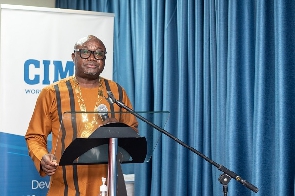National President of the Chartered Institute of Marketing, Ghana (CIMG), Dr. Daniel Kasser Tee, has advised professional associations, determined to reject government’s debt exchange programme, to reconsider their decisions, as this is necessary in facilitating the ongoing negotiations with the IMF, to reach a staff-level agreement soon.
He cautioned that government is currently incapacitated to repay its debts under the original terms, even if the proposed arrangements are rejected.
According to him, available data show that government is now no longer in a position to meet its domestic debt servicing obligations on both interest payments and principal amortisation upon maturity; therefore, even if businesses sue and secure a court judgment against government it would still default on payment.
“Many professional associations have publicly declared that, on behalf of their members, they will outrightly reject government’s proposed debt exchange programme. They are, understandably, unhappy with the sheer depth of haircut they and their members are being asked to accept.
“However, my advice – based on what I have heard experts say – is that they take a step back, control their anger and emotions, and take a good hard look at the situation they are faced with,” he said. He advised them to put their trust in the hands of their respective pension fund managers to determine what would be in their best interest and not stampede them into taking any rush decisions that would rather jeopardise the future of the pensions of their members.
Dr. Kasser Tee made these remarks at the 32nd CIMG President’s Ball held in Accra, where he was speaking on the theme ‘Creative marketing and innovation in a volatile global economy’.
He mentioned further that without the debt exchange programme, debt servicing alone will in 2023 consume close to 70 percent of Ghana’s projected tax revenues and over 55 percent of total anticipated revenues, including grants.
Providing some statistical background to the fiscal environment, he cited the world bank as reporting that in the first quarter of 2022, Ghana’s overall Gross Domestic Product (GDP) grew by 3.3 percent year-on-year, down from 3.6 percent over the same period of 2021. Unfortunately, the fiscal pressures have remained high, affecting government’s revenue mobilisation drive as some of its flagship revenue policies, such as the e-levy, faced major implementation challenges. The nation ended June 2022 with its public debt reaching 78.3 percent of GDP, while interest payments reached 54.4 percent of revenues over first-half of the year. Inflation is currently at a high of more than 40 percent, which was occasioned by the depreciating currency and soaring global commodity prices, including fertiliser – 40 percent of which is usually sourced from Russia.
Govt’s responsibility
The CIMG president, on the other hand, emphasised that it is not good for government to simply be admonishing and encouraging Ghanaians to adjust their belts while government does not show how much contribution and sacrifice it is prepared to make in return.
“The promise by the President of the Republic to cut salaries of ministers, and some appointees by 30% was a laudable one. Beyond the promise, however, most Ghanaians are yet to know how this is being done and how much savings we have made as a people.
Many political and governance experts have called on the president to scale down the number of appointees, particularly ministers, but these calls have yielded nothing. Similar calls for a reshuffle of ministers – based on performance to bring in dynamism and fresh ideas – have also not been heeded,” he said.
Dr Kasser Tee then urged Marketers to find innovative ways of promoting the interest of their organisations in hard times, such as Ghana is presently facing.
“As professional marketers, our first point of call is for us to look critically at all available and workable organic growth strategies. We must, as a matter of necessity, be proposing less risky and less costly ways of pursuing market penetration, as well as market and product development strategies. We must emphasise on value creation, from our knowledge of buyer behaviour and also take advantage of effective target marketing. The products we offer must deliver unmatched value to buyer, in terms of inherent utility and service quality. The cost of procuring those products, the channel choice, the processes involved, etc. must be far below the intrinsic benefits to be derived by the buyer and/or user”, he concluded.
In his remarks, the Chairman for the event, Deputy Minister of Education and MP for Assin South Constituency, John Ntim Fordjour challenged Marketers to rise up to the occasion to show how innovatively they can work to promote their companies and by extension, Ghana, as a corporate brand. He emphasised that: “It has become necessary for us to project the good sides of Ghana to the rest of the world. We have a lot to show, as a country, and we need your expertise in the packaging and delivery, targeting the right audience, in the wake of donor fatigue, consumer sophistication, and intensification of competition among industry players, for their product and service brands, and among nations for global attention”.
The Deputy Minister concluded by saying: “It has become exceedingly important that Marketers today leverage Technology and the wider digital resources, including artificial intelligence, augmented and virtual reality, as well as data, in the practice of marketing, customer service, advertising, etc. to ensure that you are able to reach the right customers and to make informed decisions for your various organisations and for mother Ghana as well”.
The CIMG inducted 15 new applicants as full members,8 as associate members, 4 as emerging members and 3 corporate members – totalling 33 new inductees.
Business News of Tuesday, 13 December 2022
Source: thebftonline.com













